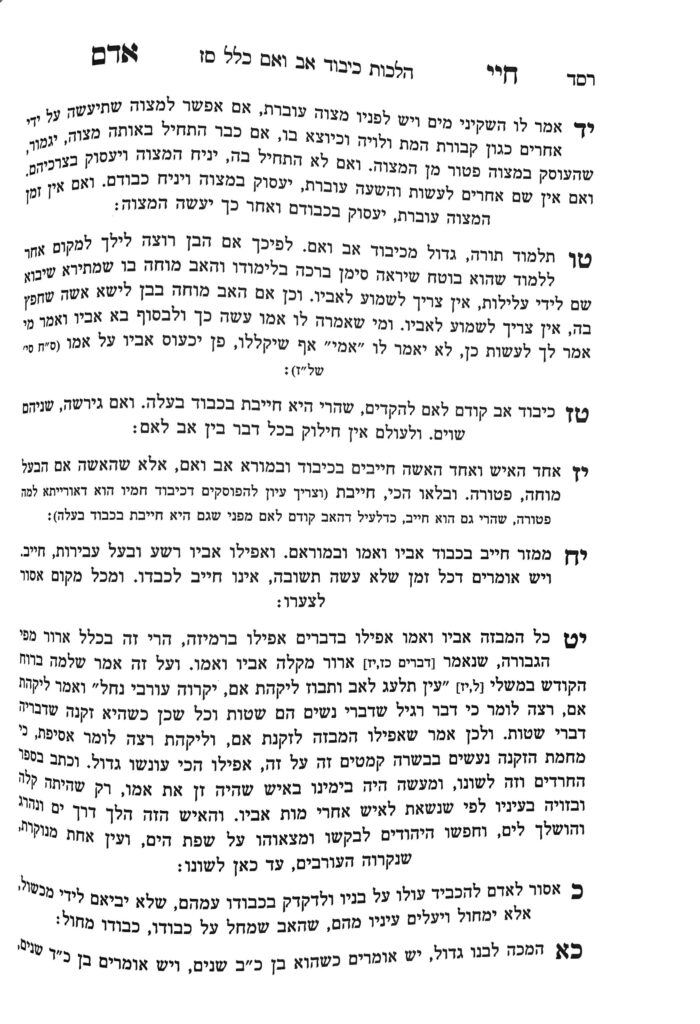We are continuing in siman 18, which discusses the chiyuv kibud av v’eim towards parents who are not shomer torah u’mitzvos. The Chayei Adam presents the opinion of the Shulchan Aruch as the primary opinion, and brings the opinion of the Rema as a secondary opinion, even though the Ashkenazi minhag generally follows the Rema. It appears that the Chayei Adam understands that the primary psak is to follow the Shulchan Aruch.
Regarding children who are baalei teshuva, whose parents likely fall under the category of tinok shenishba, where they were raised in an environment where they believed that their actions are acceptable, there are many opinions which understand that such parents do not receive the status of rasha, so the chiyuv kibud certainly applies.
If a parent is doing something wrong, and the child is trying to correct the parent, we have learned (shiur 1332) that the child must do so with the proper respect.
We learned (shiur 1350) that even when there is no chiyuv kibud, there is always a chiyuv morah, and included in the chiyuv morah is the issur to cause tzaar to one’s parents. Often, when a child becomes a baal teshuva, it causes tzaar to the parents. However, Rav Fuchs, in his sefer on Bein Adam L’chaveiro, writes that the issur of tzaar only applies when a person is trying deliberately to cause someone else tzaar. Thus, over here, where the child is not specifically trying to cause their parents tzaar, they are not transgressing the chiyuv morah. Rav Fuchs writes that he suggested this answer to several gedolim, and they concurred
We learned (shiur 1350) that both the Rema and Shulchan Aruch concur that there is no chiyuv kibud to someone who is a mumar lechachis. Defining a mumar lehachis is not simple. One suggestion is that it refers to someone who knows what is wrong, does it without compunction, transgresses mitzvos openly for the purpose of degrading the Torah without any hesitation, and will even do so in front of a talmid chochom.
The Chazon Ish understands that even someone who may qualify to be considered a mumar lehachis cannot be classified as such without being given proper tochacha first. Nowadays, it is questionable whether we have people who qualify to give the proper tochacha. Thus, relieving oneself from kibud av v’eim of such a parent is highly questionable.
Some poskim suggest that if a parent asks a child to do a specific action which is assur, besides for the fact that the child should not listen (see shiur 1340), the parent receives the status of a rasha for that specific action. Thus, even if they cannot be given the status of mumar lehachis, they are a rasha regarding that specific situation, and there is no chiyuv kibud towards them for that issue.
We learned (shiurim 1317-1321) that there is machshava, dibbur and maaseh regarding kibud av v’eim. Arguably, even if the parent is classified as a rasha, it only relieves the child of kavod b’machshava. it would not relieve the child of the obligation to perform actions on their behalf.
These are some of the general points about the chiyuv vis a vis such parents; specific questions should be addressed to a rav.
Summary
- The opinion of the Sephardim, and the opinion of the Chayei Adam, is that a child is chayav to give kavod to parents who are reshaim, unless they are considered a mumar lehachis.
- Defining a mumar lehachis is not simple. Arguably, the concept does not apply nowadays. It certainly would not apply to parents of baalei teshuva, who are generally considered tinok shenishba. Specific questions should be addressed to a rav.



